
Newsletter

|
Newsletter
|

#1 passes to #2 and cuts to the opposite block. #5 is posting up. #2 can pass to #5 in the post or to #4, who has made a v-cut to get open at the top of the key, lane line extended. |
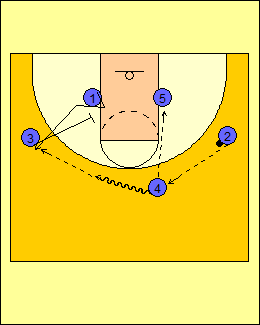
#2 passes to #4. #5 ducks in the lane. #4 can pass to #5. This duck-in from #5 will force his defender to play on the top or high side, making him a better target to screen in the lane. If #4 can't pass to #5, #4 dribbles toward #3 as a key to set up a screen. #3 screens for #1. #4 passes to #1. #1 can shoot the open jump shot. |

After screening for #1, #3 screens for #5. #5 must cut low off all cross screens. #4 then down screens for #3 (screen-the-screener action). #1 can pass to #5 inside or #3 for an open shot. You will need to work on the timing on these screens and cuts keyed from the dribble drive across the top. |

#1 passes to #3 and #3 will look into #5 posting up. Again, this ducking action will bring #5's defender on the top side, allowing him to be screened when the ball is reversed. If #5 is not open, #3 dribbles toward #2 (key to screen). #2 screens for #4 and #5, and then #2 pops out to the top. #4 uses #2's screen to get open on the wing and will receive the next pass from #3 for the open jump shot. |

If no shot is available, #4 reverses the ball to #2 who has just cut up off the screen-the-screener action inside. #2 looks quickly inside #5 before driving the ball across the top. As #2 drives the ball across the top, this keys the screening action for #1 to set a down screen for #3. #1 then continues across the lane and screens for #5. #5 always cuts toward the baseline off screens, such as this cut off #1's screen. After passing to #3, #2 screens down in the lane for #1 (screen-the-screener action). |
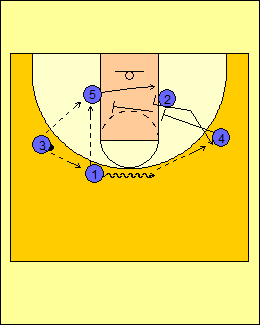
#3 can pass to #5 down low or reverse the ball to #1 to continue continuity. #4 screens for #2 cutting to the wing, then for #5 cutting to the baseline toward the opposite block. #1 passes to #2 at the wing. |
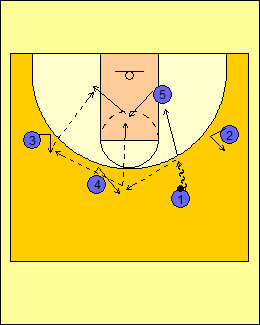
#1 passes to #4. #5 ducks in. #4 looks to pass to #5 in the mid-lane area. If not open, #4 passes to #3 on the left wing. #5 seals the defender and pivots to the low block. #3 passes to #5 inside if he is open. #1 will cut to the right low block after passing the ball to #4 on top. |
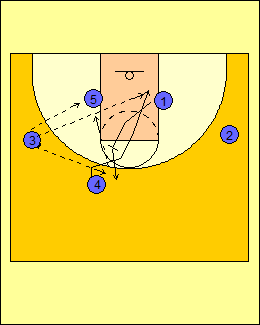
#1 now sets a back pick for #4 as soon as #4 passes to #3. #4 cuts to the basket. #3 can pass to #5 posting up, to #4 coming off the back pick or to #1. #1 looks to shoot or again will look to #5 ducking in the lane for the high / low entry. |
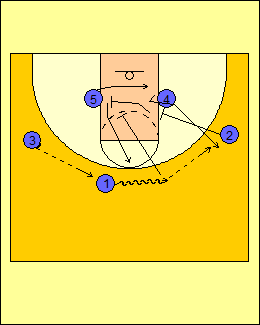
#3 now passes to #1 on top after he back screened for #4. #1 looks to pass to #5, then dribbles at #2. #2 screens for #4 and then across for #5. Continuity is set. |
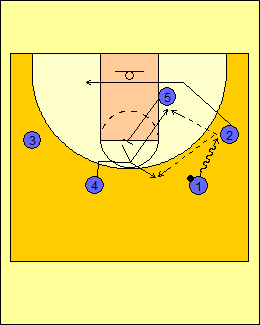
The dribble entry option allows you to bring your post player, #5, outside on the perimeter while you move another player, #4, inside for the block to block action. #1 dribbles to the wing at #2. #2 clears to the weakside post. #5 back screens for #4. #1 can pass to #4 in the post or to #5 stepping out after the screen. |

#1 passes to #5. #5 can take the shot or dribble toward #3, keying the screening action again. #3 screens for #2 and #4. The continuity continues. |
|
Created with Basketball Playbook from Jes-Soft
|